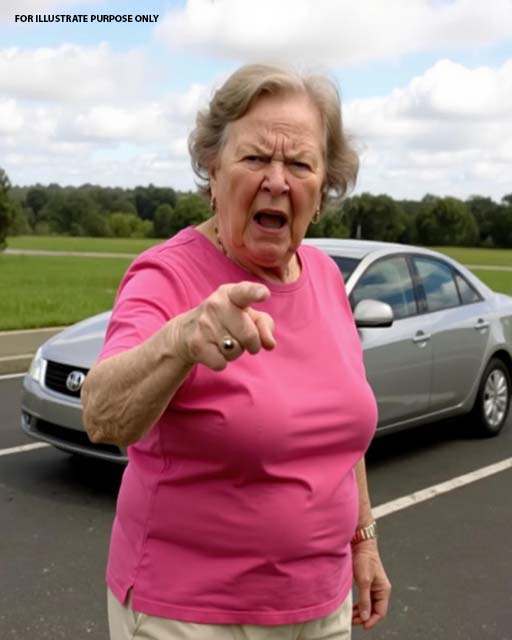When a Difficult Neighbor Pushed Too Far, One Father Pushed Back—Quietly, But Powerfully
I’m Joel. I live in a modest apartment building with my wife, Tessa, and our two young kids. Nico, our seven-year-old, is a walking encyclopedia of dinosaur facts. Lily, who’s five, is pure chaos and glitter in motion.
Life here would be nearly perfect—if not for one person.
Dolores.
Dolores from 3B. Self-declared queen of the building. She treats the rest of us like unpaid employees, always monitoring, always complaining. I could fill an entire podcast with the stories, but who has the patience?
She once left a sticky note on our door because “your child was stomping at 2:30 p.m. on a Sunday.”
Another time, she scolded Tessa for shaking out a towel—on our balcony—because the dust might contaminate her hallway garden. Yes, the hallway. Dolores has essentially colonized the shared hallway with potted plants, a cracked rolling cart, and a crate full of glass bottles. The place looks more like a yard sale than a passageway.
We tried to stay respectful. But then Lily tripped over one of her plant stands while racing to press the elevator button. She scraped her hand. Tessa, ever calm and reasonable, mentioned it to Dolores.
“Just so you know,” she said kindly, “our daughter fell over one of your pots. Maybe it could be moved a bit to the side?”
Dolores didn’t blink. “Maybe your daughter should learn to watch where she’s going,” she said.
That was strike one.
Strike two came a week later: she filed a formal complaint to the HOA because Nico was riding his scooter in the parking lot on a Saturday morning.
“Someone could get hurt,” she wrote. “Or I could be delayed getting to my car. At my age, that’s unacceptable.”
Translation: Her convenience was more important than our child’s joy.
Strike three? She banged on our door one evening—7:12 p.m. on a Tuesday—demanding we stop the washing machine. “I can hear it through the wall,” she snapped.
That’s when I realized: she didn’t just dislike us. She wanted us small. Invisible.
That was the day I decided: No more.
Then came the parking lot incident.
We had taken the kids to the mall for back-to-school shopping. The deal was: behave during shoe try-ons, and they’d earn pretzels and juice boxes. They did their part. We were exhausted—arms full of bags, backs aching.
As we loaded everything into the car, Tessa buckled Lily into her seat.
And then—
HOOONK.
A sharp, aggressive horn. We turned. I didn’t even need to look. Tessa muttered, “Dolores.”
Sure enough, there she was, jammed up behind our bumper in her beige sedan, blinker on, looking furious.
Another honk. Then she rolled down her window and yelled, “What’s taking so long, Joel? Move already!”
I signaled for her to back up a little so I could pull out. She didn’t budge.
That was it.
I looked at Tessa. She was already smiling. “You’re not seriously—”
“Oh, I am.”
I shut the trunk. Locked the car.
“Let’s go,” I said. “We’re getting dinner.”
“Pizza?” Tessa asked.
“Extra cheese.”
Dolores honked again as we walked away. We didn’t look back.
In the food court, over greasy slices, Tessa looked at me and said, “I think I love you more today than yesterday.”
When we finally returned, her car was gone. The space was clear.
It wasn’t about the parking spot. It was the principle. The years of being made to feel small. That day, we chose to not shrink.
Two weeks later, I saw her again.
It was late evening. I’d gone to grab Nico’s lunchbox from the car. I came around the corner and there she was—Dolores—standing in the lobby holding a takeout bag that smelled like curry.
She didn’t notice me at first. When I greeted her, she flinched.
“You know,” I said, keeping my voice even, “what you did in the parking lot? It wasn’t just rude. It was cruel. You scared my kids. And they don’t forget things like that.”
She started to say something—but stopped.
Then her whole posture changed. Her shoulders sank.
“You’re right,” she said quietly. After a long pause, she added, almost in a whisper, “It’s lonely… ordering takeout for one.”
She didn’t wait for a response. Just nodded and stepped into the elevator.
I stood there for a long moment, holding a dinosaur lunchbox, unsure if what I felt was justice… or sorrow.
Maybe a little of both.
Because clearly, Dolores had looked in the mirror.
And she didn’t like what she saw.
